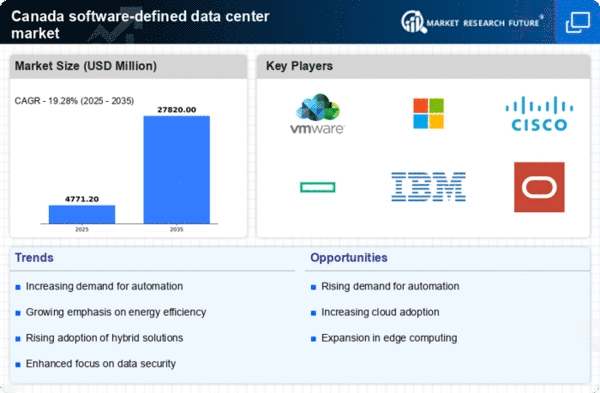Emphasis on Cost Efficiency
Cost efficiency remains a pivotal driver in the software defined-data-center market in Canada. Organizations are increasingly focused on reducing operational costs while maintaining high performance and reliability. The ability to optimize resource utilization through software-defined technologies is appealing to many Canadian enterprises. Reports suggest that companies can achieve up to 30% savings in operational costs by implementing software defined-data-center solutions. This financial incentive is prompting businesses to invest in technologies that streamline operations and reduce overhead. As a result, the software defined-data-center market is likely to see a rise in demand for cost-effective solutions that deliver tangible financial benefits to organizations.
Growing Demand for Scalability
The software defined-data-center market in Canada is experiencing a notable surge in demand for scalability solutions. Organizations are increasingly seeking flexible infrastructure that can adapt to fluctuating workloads. This trend is driven by the need for businesses to respond swiftly to market changes and customer demands. According to recent data, approximately 70% of Canadian enterprises are prioritizing scalable solutions to enhance operational efficiency. The ability to scale resources up or down without significant capital expenditure is becoming a critical factor in decision-making. As a result, vendors in the software defined-data-center market are focusing on developing solutions that offer seamless scalability, thereby positioning themselves to meet the evolving needs of Canadian businesses.
Rise of Hybrid IT Environments
The software defined-data-center market is witnessing a significant shift towards hybrid IT environments in Canada. Organizations are increasingly adopting a combination of on-premises and cloud-based solutions to optimize their IT infrastructure. This hybrid approach allows businesses to leverage the benefits of both environments, such as enhanced flexibility and cost-effectiveness. Recent statistics indicate that over 60% of Canadian companies are integrating hybrid solutions into their IT strategies. This trend is likely to drive growth in the software defined-data-center market as organizations seek to create a more agile and responsive IT landscape. Consequently, vendors are expected to enhance their offerings to support hybrid architectures, ensuring compatibility and seamless integration.
Advancements in Automation Technologies
Advancements in automation technologies are playing a crucial role in shaping the software defined-data-center market in Canada. Organizations are increasingly leveraging automation to streamline operations, reduce manual intervention, and enhance efficiency. The integration of artificial intelligence and machine learning into software defined-data-center solutions is enabling businesses to optimize resource allocation and improve performance. Recent findings indicate that automation can lead to a reduction in operational errors by up to 40%, making it an attractive proposition for Canadian enterprises. As automation continues to evolve, the software defined-data-center market is expected to expand, with vendors focusing on innovative solutions that harness the power of automation to drive operational excellence.
Increased Focus on Data Privacy Regulations
The software defined-data-center market in Canada is significantly influenced by the growing emphasis on data privacy regulations. With the implementation of stringent data protection laws, organizations are compelled to adopt solutions that ensure compliance and safeguard sensitive information. This regulatory landscape is driving demand for software defined-data-center technologies that offer enhanced security features and data management capabilities. Approximately 75% of Canadian businesses are prioritizing compliance in their IT strategies, which is likely to propel growth in the software defined-data-center market. Vendors are responding by developing solutions that not only meet regulatory requirements but also enhance overall data security, thereby addressing the concerns of Canadian enterprises.

















